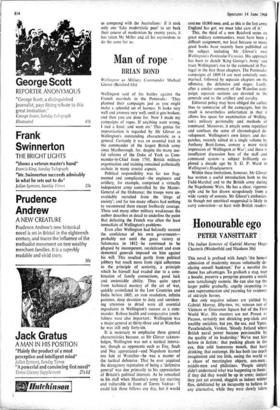Man of rope -
BRIAN BOND
Wellington as Military Commander Michael Glover (Batsford 63s) Wellington said of his battles against the French marshals in the Peninsula : 'They planned their campaigns just as you might make a splendid set of harness. It looks very well and answers very well, until it gets broken; and then you are done for. Now I made my campaigns of ropes. If anything went wrong, I tied a knot; and went on.' This genius for improvisation is regarded by Mr Glover as Wellington's outstanding characteristic as a general. Certainly it was an essential trait in the commander of the largest British army since Marlborough, for, despite the many use- ful reforms of the Duke of York as Com- mander-in-Chief from 1795, British military organisation and training remained pathetically archaic in many crucial aspects.
Political responsibility was far too frag- mented and complicated—the engineers and artillery, for example, comprised a virtually independent army controlled by the Master- General of the Ordnance; the troops were un- avoidably recruited from the 'dregs of society'; and far too many officers had nothing to recommend them except foolhardy courage. These and many other military weaknesses the author describes in detail to underline the point that defeating the French was often the least immediate of Wellington's problems.
Even after Wellington had belatedly secured the confidence of his own government— probably not until the great victory at Salamanca in 1812—he continued to be plagued by incompetent, recalcitrant and even demented generals imposed on him against his will. This resulted partly from political jobbery but much more from rigid adherence to the principle of seniority, a principle which he himself had evaded due to a com- bination of family connections, good luck and undeniable ability. Thus quite apart from technical mastery of the art of war, quickly assimilated in the Low Countries and India before 1805, an iron resolution, infinite patience, deep devotion to duty and unrelent- ing attention to detail were all essential ingredients in Wellington's success as a com- mander. Robust health and comparative youth- fulness were also important: Wellington was a major-general at thirty-three and at Waterloo he was still only forty-six.
It is necessary to emphasise these general characteristics because, as Mr Glover acknow- ledges, Wellington was not a tactical innova- tor, though as opponents such as Foy, Soult and Ney appreciated—and Napoleon learned too late at Waterloo—he was a master of the tactical defensive. That he ever acquired the derogatory reputation of being a 'defensive general' was due primarily to his appreciation of Britain's political interests. As he remarked to his staff when Massina's army lay starving and vulnerable in front of Torres Vedras: 'I could lick those fellows any day, but it would costme 10,000 men, and, as this is the last army England has gof, we must take care of it.'
This, the third of a new Batsford series on great military commanders, must have been a difficult assignment, not least because so many good books have recently been published on the subject, including Mr Glover's own Wellington's Peninsular Victories. His approach has been to sketch 'King George's Army' and trace Wellington's rise to the command in Por- tugal in the first three chapters. The Peninsular campaigns of 1809-14 are next concisely sum- marised, followed by separate chapters on the offensive, the defensive and sieges. Lastly, after a similar summary of the Waterloo cam- paign, separate sections are devoted to the generals and to the artillery and cavalry.
Editorial policy may have obliged the author thus • to summarise all the campaigns, but the result is nevertheless unfortunate in that it allows less space for examination of Welling- ton's military pers'onality and methods of command. Moreover, it entails some repetition and confuses the sense of chronological de- velopment. Wellington's own letters and des- patches, recently edited in a single volume by Anthony Brett-James, convey a more vivid impression of 'Wellington at War'; and there is insufficient discussion here of the staff and command system—a subject brilliantly ex- plored a decade ago by S. G. P. Ward in Wellington's Headquarters.
Within these limitations, however, Mr Glover has written a useful introduction both to the Field-Marshal and to the British army during the Napoleonic Wars. He has a clear, vigorous style and he has drawn scrupulously from a wide variety of sources. Mr Glover's enthusias- tic though not uncritical reappraisal is likely to carry conviction—at least with British readers.










































 Previous page
Previous page